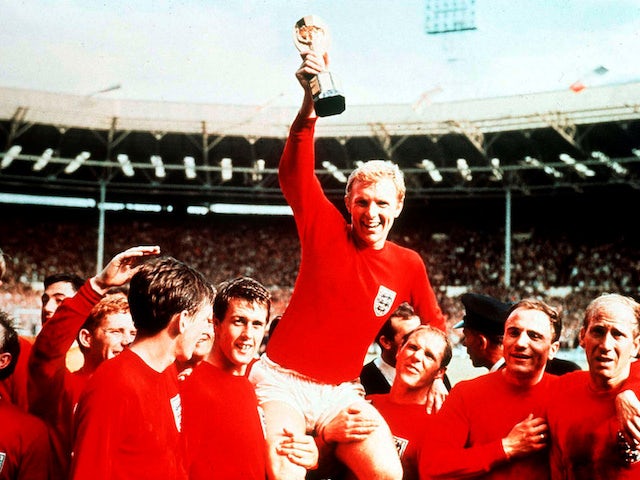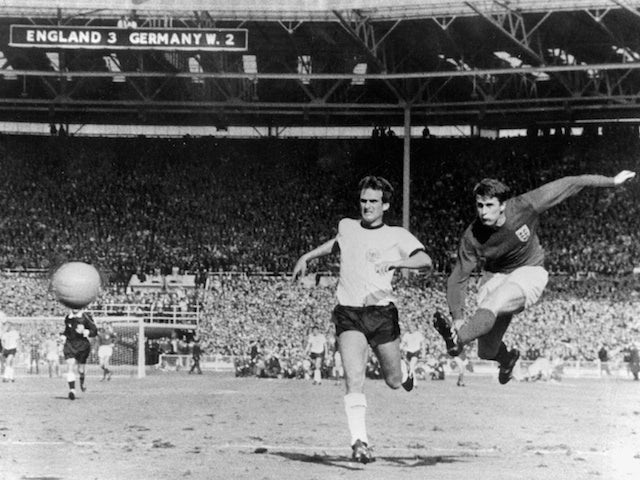July 30, 1966 remains the greatest date in English sporting history, when Sir Alf Ramsey's 'Wingless Wonders' were crowned champions of the world for the first, and so far only time.
The image of Bobby Moore hoisting the Jules Rimet trophy aloft, while he was simultaneously being lifted like a trophy himself by his adulating teammates, is the most iconic in the history of England's football team, majestically capturing the essence of the day.
Almost 97,000 people packed into Wembley and more than 32 million more watched on TV - still the most-watched event in United Kingdom's history, which is remarkable considering how many more people have television sets now.
Another generation of fans will have the chance to watch the full game when it is aired today, and to mark the occasion here Sports Mole looks back at the story of one of the most action-packed World Cup finals ever.
 © Reuters
© Reuters
NORMAL TIME
England won the toss and kicked off in front of a fervent Wembley crowd, with the hosts having made the bold choice to continue with Geoff Hurst up front rather than fit-again star striker Jimmy Greaves.
Greaves was undoubtedly the best finisher in the England squad - arguably in world football at that time - yet Ramsey felt as though Hurst had done enough throughout the tournament to earn a start in the final.
It was a call which proved hugely controversial at the time and still does to this day, although considering what transpired there is no doubt that it was the right call.
ENGLAND XI: Banks; Cohen, J Charlton, Moore, Wilson; Stiles; Ball, B Charlton, Peters; Hunt, Hurst
GERMANY XI: Tilkowski; Hottges, Schulz, Weber, Schnellinger; Beckenbauer, Overath; Haller, Seeler, Held, Emmerich
Both sides were adorned with world-class talent, but arguably the most excitement surrounded England's Bobby Charlton and Germany's Franz Beckenbauer - at that stage only 20 years old but already on course for legendary status.
Many predictions boiled down to that battle; whichever star midfielder outperformed the other would lead their side to victory.
As it was, both managers made the fascinating decision to pit them both directly against each other - Charlton was given the man-marking job on Beckenbauer and vice-versa.
In doing so, Ramsey and West Germany boss Helmut Schon willingly sacrificed potentially their most influential players in order to stunt the influence of the other team's equivalent.
While neither midfielder had the impact they had enjoyed up to that stage throughout the tournament, it did mean that the scene was set for others to write their names into folklore.
West Germany struck first, needing only 12 minutes to break the deadlock and silence the Wembley crowd.
Ray Wilson was the England man at fault, only clearing a Sigfried Held cross as far as Helmut Haller, who took a touch before firing it past Gordon Banks into the bottom corner.
The German's lead lasted all of six minutes, though; Wolfgang Overath's foul earned England a free kick which captain and centre-back Bobby Moore floated into the box, finding his West Ham United teammate Hurst completely unmarked to nod home.
It took until the 77th minute for the next goal, and it came from an unlikely figure as Martin Peters - another West Ham stalwart - scored what looked as though it could be the winner.
Hurst was again involved as his shot from outside the box took a big deflection and looped into the area, where Peters was quickest to react with a well-controlled volley past Hans Tilkowski.
England held out against increasing West German pressure as the final 13 minutes ticked by and looked to have secured the trophy until the visitors won a free kick in the 89th minute, when Jack Charlton was penalised.
What followed was one of the most high-profile goalmouth scrambles in football history, with Lothar Emmerich's free kick deflecting off the wall but landing at the feet of Held inside the area.
His strike hit his own man Karl-Heinz Schnellinger to send it bouncing across the face of goal, where Wolfgang Weber was in the right place at the right time to fire past a scrambling Banks and force extra time.
EXTRA TIME
Having come so close to victory, England's players were naturally distraught when the end of 90 minutes arrived - suddenly the momentum was with the Germans heading into another 30 minutes in the energy-sapping heat.
Cue Alf Ramsey, who proved that he has that rarest and most precious attribute in great managers of producing the perfect team talk at the biggest time.
The notorious disciplinarian dragged his players off the turf and refused to let them sit down in a message to the Germans that England were still fresh and ready to go for another 30 minutes.
That sent a physical message, and his words - along the lines of "you've won it once already, now go out and win it again" - helped to rebuild the mental fortitude of the players immediately after such a devastating blow.
It worked almost instantaneously; within five minutes of the restart Bobby Charlton had hit the post and sent another effort narrowly wide.
Six minutes later came arguably the most contentious moment in World Cup history, and a question to which we still do not have a definitive answer today - did the ball cross the line?
The English will say yes, Germans will say no - you can make your own mind up while watching along.
Either way, Hurst's swivel and shot from the inexhaustible Alan Ball's cross was given after cannoning off the underside of the crossbar and bouncing down behind the goalkeeper, and apparently behind the line too.
Referee Gottfried Dienst consulted with USSR linesman Tofiq Bahramov, who gave the green light to award the goal, sparking debate, arguments, euphoria and anger in equal measure across the 400 million TV viewers around the world.
The decision was such a notorious one that Bahramov has a stadium named after him in his native Azerbaijan - surely the only linesman to have been afforded that honour - while the crossbar is now on show at Wembley.
Today's best technology has suggested that the whole of the ball did not cross the whole of the line, yet those on the day cited Roger Hunt's celebration as the closest England player as evidence that it did. Had he not believed it was over the line, Hunt could have tried to tap in the rebound.
Once the dust had settled, Germany again found themselves piling forward for an equaliser as time ticked on, having no option but to leave themselves more vulnerable in defence as a result.
One such German attack ended up with Moore collecting the ball and, despite cries from his teammates to simply clear his lines and get the danger as far away as possible from Banks's goal, the skipper showcased the type of composure which had become his trademark.
Moore took his time to pick a long pass over the defence for Hurst, who raced through on goal with a depleted and disorganised back line nowhere to be seen.
 © Reuters
© Reuters
Legend has it that Hurst was not quite as composed as his clubmate Moore and was simply trying to hit the ball as far into the Wembley crowd behind the goal as possible when he put his laces through a thunderous left-footed strike.
The actual outcome was even more useful as the ball flew into the top corner, leaving Tilkowski rooted to the spot as Hurst completed his hat-trick - still the only one to have ever occurred in the final of a men's World Cup.
That goal would be iconic enough without the immortal line of commentator Kenneth Wolstenholme alongside it: "And here comes Hurst. He's got... some people are on the pitch, they think it's all over. It is now! It's four!"
The final whistle sparked scenes of celebration never seen before or since in football terms for England, with Nobby Stiles dancing, Moore wiping his hands before receiving his medal and then lifting the biggest prize in the sport with an almost understated sense of modesty.
Ramsey's entire squad will forever be remembered for that great day, and it remains the benchmark by which all future generations of England teams will be judged.
No Data Analysis info








